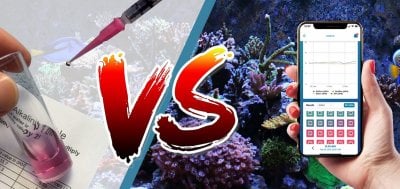This is a controversial topic in the reefing community and often draws fervent responses from reefers supporting one method or the other. In this article, we are going to examine some of the claims made by both camps, highlight the main differences, and help you make up your mind.
Manual testing is awesome:
Reefers who prefer to manually test their tank’s water often claim that they derive a lot of pleasure from the process of manual testing itself and go on to say that switching to automatic water-testing would take that pleasure away. Given the subjective nature of this claim, it’s impossible to produce a counterargument from the other camp. Suffice it to say that if you are one of these people, then just keep doing you!
Automatic testing is super convenient:
The most beneficial advantage of automatic water testing is that it is more convenient and less time-consuming than manual testing. This is especially useful for reefers who lead busy professional lives and find that they have very little time to take care of their aquatic life. Part of the convenience of automatic testing also lies in the fact that you can run the tests remotely without even having to be physically present to do so, which can literally be a lifesaver when you are travelling! This is the case with the ReefBot, which allows you to fully customize the testing schedule and receive the results via web or mobile app.
Manual Testing is more accurate:
Some members of the community have the perception that manual testing is more accurate than automatic testing, likely because they feel they have more control over the process and are thus more prone to trust it. However, the truth is that automatic testing devices are also similarly accurate, depending on each specific device and how it works of course. In the case of the ReefBot for example, the device tests the parameters using the same off-the-shelf brands used by manual testers, which means that the results are identical to what you would get through manual testing without the human error.
Automatic testing is consistent
Given the mechanical nature automatic testing, the margin for human error usually seen in manual testing is completely eradicated. Taking the example of the Reefbot again, the margin of error of the device when using titration to test the parameters does not exceed %2.5, which is completely insignificant for generating and interpreting the results. The margin of error in manual testing on the other hand is far higher, though it’s hard to put a specific number on it.
Manual testing allows you to test more parameters
This is certainly the case with some of the automatic testing devices available on the market, which usually test between 1-3 main parameters. This is not the case our ReefBot, however, which is currently capable of testing up to 7 parameters, and more are on the way!
We cannot objectively conclude that one method is better than the other, as that depends on several factors such as the reefer’s preferences, their lifestyle, time-commitments… But, we do hope that we have been able to illuminate some of the main differences between the two testing methods and helped you form your own opinion. We would love to hear your opinion; please feel free to leave a comment below!
Download the Reef Kinetics Cloud Controller App:

Last edited:


















